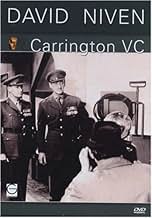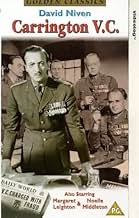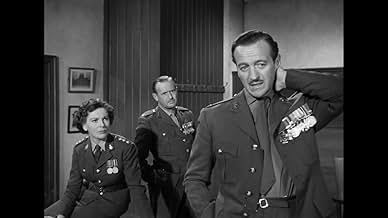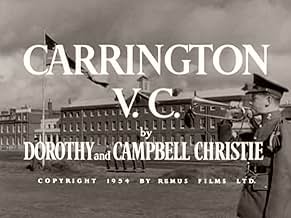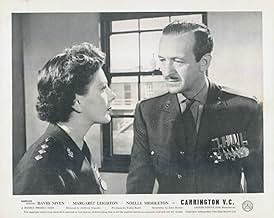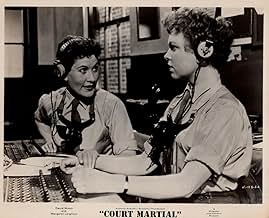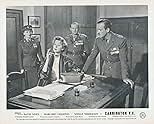Ajouter une intrigue dans votre langueA court-martial attempts to find out why, and if, an officer embezzled his unit's funds.A court-martial attempts to find out why, and if, an officer embezzled his unit's funds.A court-martial attempts to find out why, and if, an officer embezzled his unit's funds.
- Director
- Writers
- Stars
- Nominé pour le prix 5 BAFTA Awards
- 5 nominations au total
Avis en vedette
Carrington, VC finds career army officer David Niven doing something reckless and
a bit stupid besides. He borrows a bit of money from the Officer's Fund of his
unit to pay some household bills. He's owed a lot of back pay allowances that
the fine military machine of the British army hasn't seen fit to cough up. But he
is a winner of the Victoria Cross, the VC of the title and the commander of the
regiment Allan Cuthbertson is a most jealous man. He might be the head of the
regiment, but the men look to Niven.
If you remember the Clint Eastwood film Heartbreak Ridge at one point Gunnery Sergeant Eastwood helps out one of his enlisted men make ends meet the way Niven is having problems with his wife and family. But officers don't have concerned gunnery sergeants.
In any event Niven is being court martialed for the offense, charges brought by Cuthbertson. How it goes I will not say, but Niven is given a royal kick in the keester by a jealous wife Margaret Leighton who suspects some hanky panky going on with a female officer and her husband.
The great critique by me and others is that David Niven more than any other actor had to carry a lot of mediocre films on the strength of being debonair and charming. Not so in Carrington, VC, this is a fine military courtroom drama that stands on its own merits. Niven does well in the lead and grateful for this being a film he didn't have to carry.
Allan Cuthbertson is one of those actors who just does well in everything he's cast in. He's quite the martinet and jealous of Niven's war service and decoration. He spent the war directing a shore battery that was called upon to shoot down Mr. Hitler's Luftwaffe planes, no chance for medals or glory there.
The second member of the supporting cast who is outstanding is Victor Maddern playing Niven's sergeant and biggest fan.
Carrington, VC has a bit of The Caine Mutiny and some of The Winslow Boy in its plot and presentation. But it's a good courtroom drama and all actors love doing them.
If you remember the Clint Eastwood film Heartbreak Ridge at one point Gunnery Sergeant Eastwood helps out one of his enlisted men make ends meet the way Niven is having problems with his wife and family. But officers don't have concerned gunnery sergeants.
In any event Niven is being court martialed for the offense, charges brought by Cuthbertson. How it goes I will not say, but Niven is given a royal kick in the keester by a jealous wife Margaret Leighton who suspects some hanky panky going on with a female officer and her husband.
The great critique by me and others is that David Niven more than any other actor had to carry a lot of mediocre films on the strength of being debonair and charming. Not so in Carrington, VC, this is a fine military courtroom drama that stands on its own merits. Niven does well in the lead and grateful for this being a film he didn't have to carry.
Allan Cuthbertson is one of those actors who just does well in everything he's cast in. He's quite the martinet and jealous of Niven's war service and decoration. He spent the war directing a shore battery that was called upon to shoot down Mr. Hitler's Luftwaffe planes, no chance for medals or glory there.
The second member of the supporting cast who is outstanding is Victor Maddern playing Niven's sergeant and biggest fan.
Carrington, VC has a bit of The Caine Mutiny and some of The Winslow Boy in its plot and presentation. But it's a good courtroom drama and all actors love doing them.
A brilliant courtroom drama that doesn't rely on flashbacks to present its case but sticks solely to the testimonies of the various parties involved. Carrington is a major being court-martialed for stealing money which he claims was his by right. It's superbly written, (by John Hunter), directed, (by Anthony Asquith) and played, (by a superlative cast of British character actors). David Niven, at his very best, is Carrington and Margaret Leighton is terrific as his highly strung and jealous wife. The Irish actress, Noelle Middleton, is also excellent as the captain with more than a soft spot for Niven. This is a gripping and intelligent film that really deserves to be seen.
Major David Niven V.C. is up on charges. Two are minor, but the third one can break him, and possibly sent him to prison: that he surreptitiously took 125 pounds from the company safe. His defense is that he was owed the money, which no one denies, and that he told his Commanding Officer that he was going to do it. He told his wife, Margaret Leighton so over the phone; he also told fellow officer Noelle Middleton he had told his C.O. However, the C.O., Allan Cuthbertson, denies it. This being David Niven at the peak of his career, the movie is clearly slanted in Niven's favor, although the evidence presented to the Court is not. That's a necessary part of the dramatic tension.
Anthony Asquith directs this to bring out the ritual nature of Army life. The performances vary between those ritualized interactions, and things said in private in a very engaging fashion.
Asquith had begun his directing career in the silent era with a bang, with two late silent stunners, SHOOTING STARS and UNDERGROUND. Then something happened to his career in the mid-1930s. When he returned to directing in 1938, he specialized in films derived from stage works by Shaw, Rattigan and Oscar Wilde. The performances he got for these first-rate properties were wonderful, but they certainly seemed more staged plays than movies.
Although this movie is an original screenplay, it very much seems an opened-out play. Certainly, it is a a fine adaptation, but it would have taken little work to convert its borders to a proscenium arch. Despite this, it is a fine story with excellent performances all around.
Anthony Asquith directs this to bring out the ritual nature of Army life. The performances vary between those ritualized interactions, and things said in private in a very engaging fashion.
Asquith had begun his directing career in the silent era with a bang, with two late silent stunners, SHOOTING STARS and UNDERGROUND. Then something happened to his career in the mid-1930s. When he returned to directing in 1938, he specialized in films derived from stage works by Shaw, Rattigan and Oscar Wilde. The performances he got for these first-rate properties were wonderful, but they certainly seemed more staged plays than movies.
Although this movie is an original screenplay, it very much seems an opened-out play. Certainly, it is a a fine adaptation, but it would have taken little work to convert its borders to a proscenium arch. Despite this, it is a fine story with excellent performances all around.
Imagine a cross between The Caine Mutiny and 12 Angry Men, and you'll get Court Martial. This military courtroom drama is tense, thrilling, and will keep you at the edge of your seat from beginning to end.
David Niven is a highly respected and decorated major, and he's been court martialed for three offenses: stealing money, entertaining a woman in his quarters, and leaving the base without permission. The entire film takes place in the courthouse, and it is intense! The men on the jury all know David Niven personally, and they try to put their bias aside for the sake of the law. Noelle Middleton, a captain, tries to defend him-but is she also biased, since she was the woman in his quarters? And finally, Niven's wife: Margaret Leighton. Niven insists she's too ill to testify, but when she shows up in court, will she condemn or defend him?
The acting in this film is fantastic, not only by Niven and his two leading ladies, but also by the supporting men on the jury. It's very hard to act in a real-time film, because you constantly have to have an emotional buildup in your character's performance-there's no "three weeks later" downtime in the plot, or a cutaway to another character's side-story. Anthony Asquith must have given his actors great direction, because they were all very convincing. John Hunter's script, based on Campbell and Dorothy Christi's play, is intelligent, thoughtful, and fast-paced; you're going to need to pay close attention on this one, but it's worth it! Unfortunately for this movie, it came out the same year as the more successful The Caine Mutiny, so the Academy forgot about the British drama at the Oscars. Although Humphrey Bogart was very good, David Niven absolutely deserved a nomination for his incredible performance.
David Niven is a highly respected and decorated major, and he's been court martialed for three offenses: stealing money, entertaining a woman in his quarters, and leaving the base without permission. The entire film takes place in the courthouse, and it is intense! The men on the jury all know David Niven personally, and they try to put their bias aside for the sake of the law. Noelle Middleton, a captain, tries to defend him-but is she also biased, since she was the woman in his quarters? And finally, Niven's wife: Margaret Leighton. Niven insists she's too ill to testify, but when she shows up in court, will she condemn or defend him?
The acting in this film is fantastic, not only by Niven and his two leading ladies, but also by the supporting men on the jury. It's very hard to act in a real-time film, because you constantly have to have an emotional buildup in your character's performance-there's no "three weeks later" downtime in the plot, or a cutaway to another character's side-story. Anthony Asquith must have given his actors great direction, because they were all very convincing. John Hunter's script, based on Campbell and Dorothy Christi's play, is intelligent, thoughtful, and fast-paced; you're going to need to pay close attention on this one, but it's worth it! Unfortunately for this movie, it came out the same year as the more successful The Caine Mutiny, so the Academy forgot about the British drama at the Oscars. Although Humphrey Bogart was very good, David Niven absolutely deserved a nomination for his incredible performance.
This is quite a decent military court-room drama in which David Niven finds himself accused of pinching a large sum from his battalion funds. At the ensuing court martial, he must answer the charges relying on his honesty and integrity - he has a V. C. after all - and on receiving, somewhat naively, a reciprocal degree of honesty and integrity from others. It's quite a neat little story about revenge and snobbery; tempered with the odd bit of human decency and Niven is ideal for the part. Margaret Leighton is also quite good as his rather aloof wife and Allan Cuthbertson as his supercilious commanding officer "Col. Henniker" who clearly both have axes to grind. The ending isn't great, but otherwise it is a simple story well told.
Le saviez-vous
- AnecdotesThe VC worn by David Niven was a genuine medal borrowed by the studio. It belonged to Arthur Henry Cross VC, Machine Gun Corps (Camberwell).
- GaffesA British court-martial appeal does not allow new evidence, as it is not a retrial of a case, but a trial of the trial itself, to argue improper procedure or other problems with the trial.
- Citations
Major Broke-Smith: What's he like?
Lt. Col. Reeve: Henniker? Proper bastard if you ask me.
- ConnexionsRemade as ITV Play of the Week: Carrington V.C. (1960)
Meilleurs choix
Connectez-vous pour évaluer et surveiller les recommandations personnalisées
- How long is Court Martial?Propulsé par Alexa
Détails
- Durée1 heure 46 minutes
- Couleur
- Rapport de forme
- 1.37 : 1
Contribuer à cette page
Suggérer une modification ou ajouter du contenu manquant

